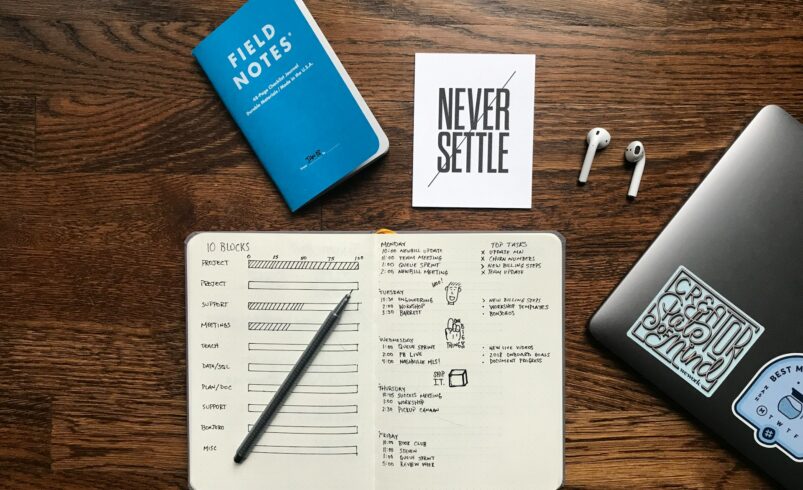Balancing hectic work schedules with personal well-being can feel overwhelming. However, maintaining strong mental health and reducing work stress doesn’t always require huge lifestyle changes.
Small, actionable self-care tips can make a significant difference in your daily life. This guide will explore six practical ways to weave wellness routines into your busy schedule without compromising your professional responsibilities.
From micro-meditations to the soothing power of aromatherapy, these strategies are simple, effective, and designed for even the most time-strapped professionals.
Incorporate Micro-Meditation Sessions Into Your Day
Why it works
Micro-meditation is the perfect solution for professionals who feel too busy for traditional meditation practices. These short, focused sessions—often as brief as two to five minutes—help clear your mind, reduce stress, and improve focus.
How to start
- Set a timer for three minutes during a natural break in your day.
- Find a quiet space, close your eyes, and slowly breathe in through your nose and out through your mouth.
- If you find your mind wandering, gently bring it back to focus on your breath or repeat a calming phrase.
Free apps like Calm and Headspace offer quick guided meditations tailored to busy schedules, making it easier to integrate micro-meditation into your routine.
Create a Weekly Wellness Routine
Why planning matters
Having a consistent weekly routine helps establish self-care as a non-negotiable part of your life. When penciled into your calendar alongside meetings and deadlines, self-care is more likely to become a habit rather than an afterthought.
Building your wellness routine
- Dedicate one evening each week for a longer self-care session, such as a bubble bath, yoga, or reading your favorite book.
- Choose a day to plan your meals for the week—nourishing food supports both your physical and mental health.
- Include personal development activities like journaling or reviewing recent achievements.
By sticking to a structured routine, you’ll promote balance in your professional and personal life.
Use Aromatherapy to Boost Calm and Focus
The science behind aromatherapy
Aromatherapy isn’t just about pleasant scents. Studies show that specific essential oils, such as lavender and eucalyptus, may reduce stress and promote relaxation. Alternatively, citrus-based essential oils like lemon or orange can invigorate your senses and sharpen your focus.
Using aromatherapy at work
- Invest in an essential oil roller to quickly apply calming scents to your wrists during high-stress moments.
- Use a portable diffuser at your desk with an uplifting oil like peppermint.
- Create an unwinding ritual by diffusing lavender in the evenings.
This simple practice can work wonders in creating a balanced work-life atmosphere.
Break Your Workday Into Productive Chunks
Using the Pomodoro technique
One common cause of work stress is burnout from prolonged focus on tasks. The Pomodoro technique breaks your workday into 25-minute chunks of deep focus, followed by five-minute breaks.
These intervals allow you to recharge mentally while maintaining high productivity throughout the day.
How to maximize your breaks
- Take a short walk, even if it’s just to the kitchen for a glass of water.
- Stretch your neck, shoulders, and wrists to release physical tension.
- Use the opportunity for a micro-meditation session or deep breathing exercise.
This technique not only enhances your productivity but also prevents overwhelming work fatigue.
Invest in Your Physical Activity
The connection between movement and mental health
Exercise is not only essential for physical well-being but also plays a crucial role in maintaining mental health. However, as a busy professional, making time for gym visits or structured workouts can seem daunting.
Easy ways to include movement in your day
- Take quick walks during phone meetings or your lunchtime.
- Spend five to 10 minutes stretching after waking up or before bed.
- Try virtual fitness classes and pick short, high-energy options like 15-minute HIIT workouts.
Even small bursts of physical activity can do wonders for reducing stress and refreshing your mind.
Stay Connected to a Support Network
Managing stress through connection
Sharing burdens with others can greatly reduce work stress. Having a strong support network fosters a sense of community and helps validate your feelings during stressful times.
Building and maintaining connections
- Schedule a biweekly coffee date or virtual meeting with a trusted friend, family member, or mentor.
- Join professional groups or attend networking events to find like-minded individuals.
- Engage with online communities focused on self-care and wellness for support.
Staying connected doesn’t have to take up a large portion of your schedule but can have a profound impact on your well-being.
Redefine Your Approach to Self-Care
Self-care is not a luxury—it’s a necessity, especially for professionals balancing demanding careers.
By integrating small but meaningful wellness routines like micro-meditation, aromatherapy, and scheduled physical activity, you can prioritize your mental health without sacrificing productivity.
Start implementing one or two of these strategies today and adjust as needed to find what works best for you. Over time, these minor changes can lead to significant improvements in your ability to manage stress, focus, and maintain a positive mindset toward work and life.
Feeling inspired yet unsure where to begin? Bookmark this guide and revisit it as you redefine self-care on your terms.










